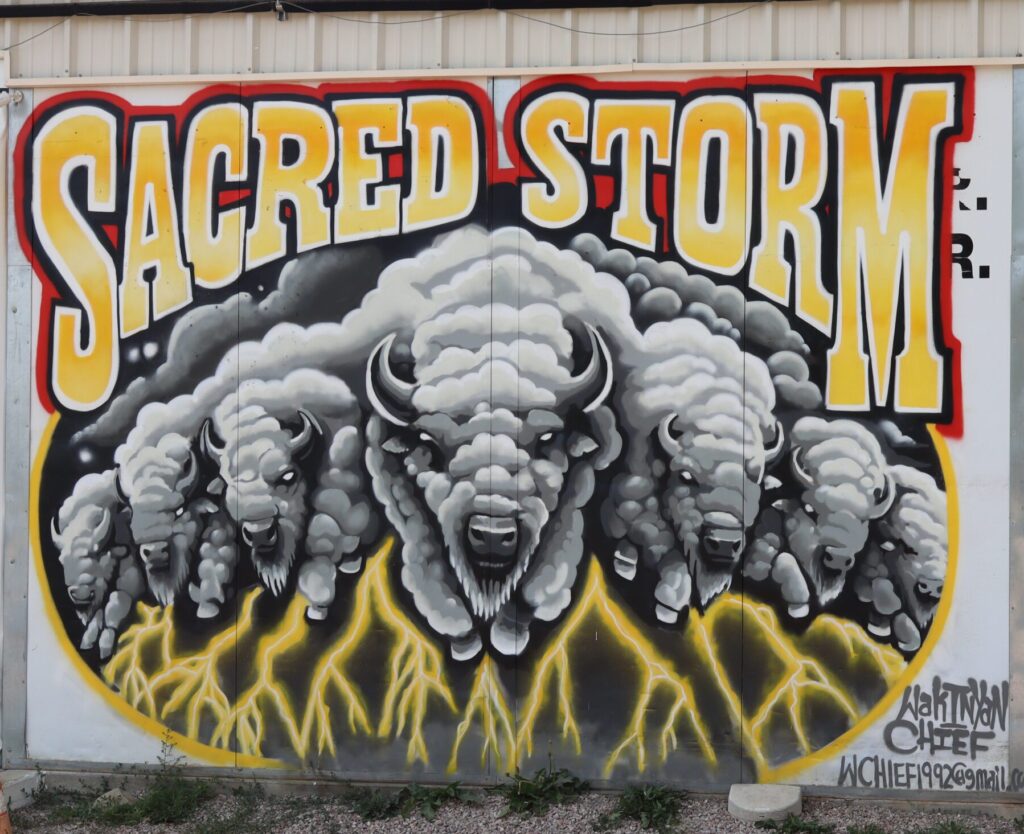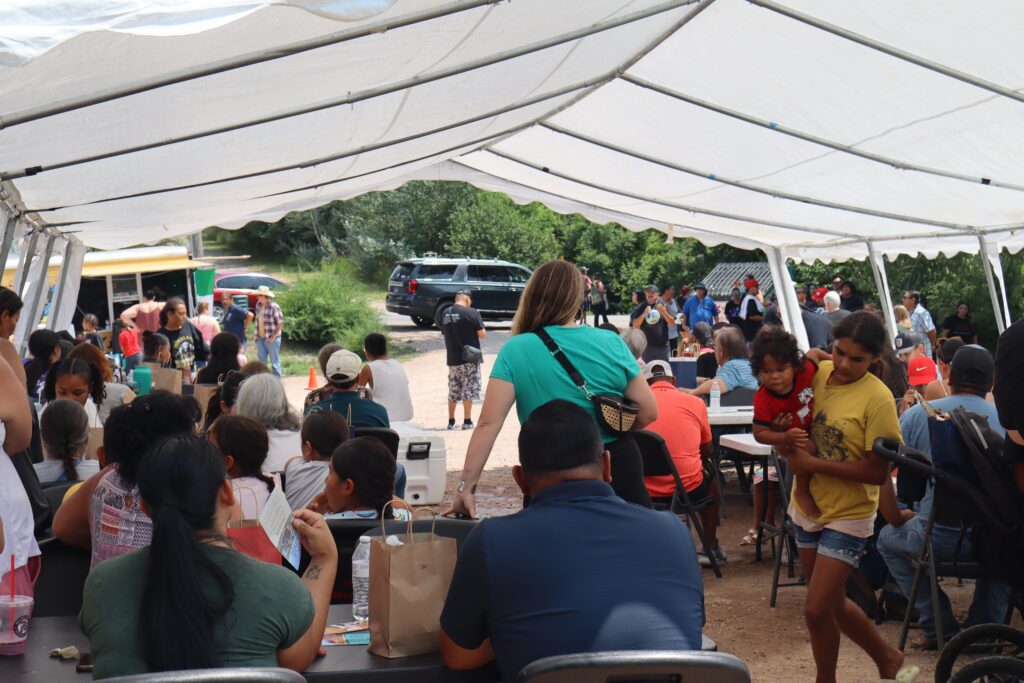The only Native community owned red meat processing facility in the Upper Great Plains opens
RAPID CITY – The buffalo restoration movement took a big step forward this weekend with the grand opening of Sacred Storm Buffalo and their new meat processing facility in Rapid Valley. Sacred Storm Buffalo is a new workforce development enterprise focused on creating sustainable futures through food sovereignty and cultural preservation.
In partnership with Wambli Ska Okolakiciye, Tanka Fund, and Makoce Agriculture Development and with support from NDN Collective, Sacred Storm Buffalo through each of these organizations, will develop a meat processing apprenticeship and cultural education program for young leaders, training them in traditional food systems and culturally relevant food choices.
The Lakota, like many Indigenous tribes, had strong ties with bison relying on them for sustenance, shelter and cultural and religious practices. For the Lakota, the buffalo is a relative, who in the Lakota creation story, sacrificed itself so that the people could live. The buffalo provided food, clothing and tools. The buffalo taught the people how to care for the land and were central to the Lakota diet.
It’s estimated that the North American bison once numbered 60 million before being driven to near extinction in the nineteenth century due to uncontrolled hunting and United States policy of eradication to starve out and control Native American Tribes. By 1889, only a few hundred buffalo remained.
Buffalo are a keystone species. A keystone species has a disproportionately large impact on the ecosystems in which they exist and are central to the health and stability of the natural ecosystem. Buffalo are a keystone species for the prairies, helping to regenerate the soil which in turn creates conditions for other species like birds, insects and plants.
Because the buffalo are a keystone species, their decline has resulted in the decline of healthy grasslands. Land conversion has also contributed to the decline of important grassland wildlife like pollinators and migratory birds. These practices contributed to the Dust Bowl of the 1930’s.
Restoration efforts began in the twentieth century which have helped to secure the species, but the Department of Interior says the buffalo remains functionally extinct to both grassland systems and the human populations they sustained.
Nick Hernandez, CEO and founder of Makoce Agriculture Development says that this new partnership is an opportunity to take back the local food systems by way of the modern food systems that had originally been used to suppress the people, and create accessibility and opportunities, while practicing conservation.
“Our partnership will lead key systems to make this plant function: Makoce Agriculture Development will lead the development of the first multipurpose community food hub facility, Tanka Fund will work with buffalo and cattle stewards in the local and regional supply chain for regeneratively raised protein, and Wambli Ska will lead employment development and operations of the Sacred Storm Processing Facility and Warrior Lodge. This red meat facility will be the only Native community owned, operated, and managed facility in the Upper Great Plains and Indian Country.”
He said they currently have 19 different ranchers, 7 from South Dakota down to Texas and to Alabama, all Indigenous. “We’re the only non-profit that works specifically with Indigenous private ranchers. The ones that may not be able to qualify for government or tribal funding, that’s where we step in to fill that gap.”
The Saturday afternoon celebration took place on the Sacred Storm grounds, where the Warrior Lodge employee housing and the processing facility bookend a lush, green gathering area. Here there was a temporary tent and tables set up to provide some shelter for the more than 100 or so relatives and neighbors who came to witness the launch of this groundbreaking economic endeavor.
NDN Collective presented the partnership organization with a $1.6 million dollar check, saying they’re excited to support the work of Sacred Storm Buffalo through their Indigenous designed power-building loans.
“NDN Collective’s decolonized lending program prioritizes projects that balance meaningful impact with financial sustainability – and Sacred Storm exceeded every single one of our criteria,” said Tawny Wilson, Director of Lending for NDN Collective. “This project supports a greater network of community support in improving food security, workforce development, cultural preservation, and supportive housing in the region. Each partner leveraged their strengths and unique expertise to maximize impact and pool resources to restore food systems in the hands of Indigenous Peoples.”
The apprenticeship program was created to chart a path forward for youth in the area to learn traditional harvesting techniques and cultural teachings through meat processing. It’s an opportunity to reconnect Indigenous youth with buffalo and the cultural relevance of the animal both in ceremony and food systems.
“This is about more than a job – this is about learning a new way of life,” said Chris White Eagle, Executive Director of Wambli Ska Okolakiciye. “I want to make sure these boys have opportunities, feel safe, can stay sober, and learn to live a different life.”
“This partnership with Wambli Ska Okolakiciye and Makoce Agriculture Development is a crucial step in our mission to return buffalo to native lands, lives, and economies. Through this collaboration, we will continue to create opportunities within the buffalo economy and market,” said Dawn Sherman, Executive Director of Tanka Fund. “Historically, the buffalo economy was integral to our people’s way of life – herds were unjustly taken away to subjugate and relocate our people. By supporting the stewards of the land and the buffalo, we aim to restore and revitalize these opportunities, ensuring a regenerative and sustainable future for our communities.”
“NDN Collective’s decolonized lending program prioritizes projects that balance meaningful impact with financial sustainability – and Sacred Storm exceeded every single one of our criteria,” said Tawny Wilson, Director of Lending for NDN Collective. “This project supports a greater network of community support in improving food security, workforce development, cultural preservation, and supportive housing in the region. Each partner leveraged their strengths and unique expertise to maximize impact and pool resources to restore food systems in the hands of Indigenous Peoples.”
(Contact Marnie Cook at cookm8715@gmail.com)
The post The only Native community owned red meat processing facility in the Upper Great Plains opens first appeared on Native Sun News Today.


